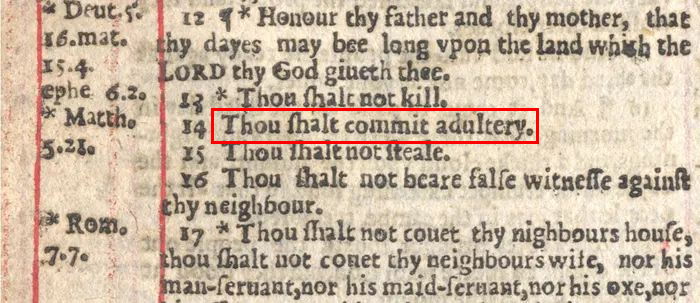A scandalous printing mistake in a 17th century King James Bible caused it’s printers to lose their license, and a vast majority of the bible copies to be hunted and destroyed. The copy itself earned the nickname “Wicked Bible”, thanks to an unfortunate, but hilarious mistake in the Ten Commandments.
In 1631, Robert Barker and Martin Lucas, both royal printers in London, obtained permission from King Charles I of England to print a word-for-word copy of the King James Bible. About a thousand copies were printed. However, when the bible was inspected it was found to contain a grave printing mistake. Compared with modern printing, books of this time often contained careless mistakes, but this one was hard to ignore. In Exodus 20:14, also known as the Ten Commandments, Barker’s bible proclaimed “Thou shalt commit adultery.” Barker’s type-setter had forgotten the very important “not” part of the sentence.

The King Charles I was outraged and so was George Abbot, the Archbishop of Canterbury, who said:
I knew the tyme when great care was had about printing, the Bibles especially, good compositors and the best correctors were gotten being grave and learned men, the paper and the letter rare, and faire every way of the beste, but now the paper is nought, the composers boyes, and the correctors unlearned.
Barker and Lucas were summoned by King Charles I before the court where they were admonished for their sloppy workmanship. The King had their license revoked and fined £300. The King also ordered every copy of the bible destroyed. The strain of the fine as well as other financial difficulties left Barker in debt, and he ended up in debtor’s prison where he died in 1643.
Barker’s bible also contained another “gross error”. In Deuteronomy 5: the word “greatness” appearing as “great-asse”, leading to a sentence reading: “Behold, the Lord our God hath shewed us his glory and his great-asse”.
Related: Codex Gigas, The Devil's Bible
The two blasphemous mistakes in the same Bible have led some scholars to conclude they were an act of sabotage.
“If it had just been one mistake, like leaving off the ‘not’ in Exodus 20:14, it could have been an accident,” said Diana Severance, director of Dunham Bible Museum at Houston Baptist University. “But the mistake in Deuteronomy 5:24 of God’s ‘great-asse,’ instead of greatness, suggests there was something else going on.”
Severance believes that the second error indicates that someone purposefully sabotaged the printing of the Wicked Bible so that Robert Barker and Martin Lucas would lose their exclusive license to print the Bible.

A surviving copy of the Wicked Bible. Photo: Narrington77/Wikimedia
As noted, typographical errors were very common in printing at that time, and the Wicked Bible isn’t the only one that completely reverses the meaning of the scriptures.
In 1613, the same Robert Barker printed another bible where the name “Jesus” was replaced by “Judas” in Matthew 26:36.
In 1653, in an edition printed by Cambridge Press, the word “not” was mistakenly omitted before “inherit” making 1 Corinthians 6:9 read “Know ye not that the unrighteous shall inherit the kingdom of God?”. In the same copy, Romans 6:13 reads “Neither yield ye your members as instruments of righteousness into sin”, where it should read "unrighteousness".
In a bible from 1716, Jeremiah 31:34 reads "sin on more" rather than "sin no more".
In a 1717 copy published by J. Baskett, Clarendon Press, the chapter heading for Luke 20 reads “The Parable of the Vinegar” instead of “The Parable of the Vineyard.”
In a 1763 bible, Psalm 14:1 reads “the fool hath said in his heart there is a God”, rather than “there is no God”. The printers were fined £3,000 and all copies ordered destroyed.












Comments
Post a Comment